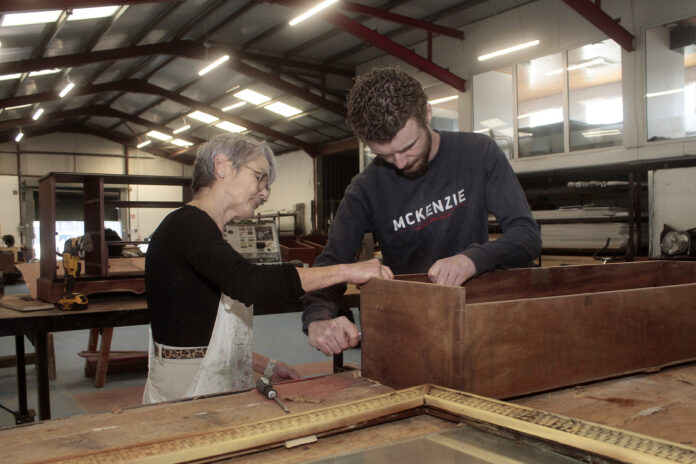
WHEN intense gangland feuding in Limerick ground to a halt in 2011 after over a decade of bloodshed, the city focused on leaving its violent past behind. But for communities torn apart by the brutality, and the many young men in particular recruited into a life of crime by their peers, the aftermath left a lasting mark.
Soon after, focus shifted to supporting communities in forging a new direction — one that broke away from a life of crime and the consequences of the criminal justice system.
One such pathway, Limerick City Build (LCB) Training Academy, was established in 2012 by Catherine and Ray O’Halloran in an effort to “interrupt the trajectory” of crime and punishment, and to help those already behind bars to adjust to life on the straight and narrow after prison.
LCB, described by its co-founders as “a legitimate alternative to prison”, offers employment pathways for marginalised and socially excluded people in Limerick. It also offers training based on employment needs, construction industry skills, as well as peer support and psychotherapy.
While self-referrals are considered, co-founder Catherine O’Halloran told the Limerick Post that many of the participants come from the prison service. This can involve online pre-assessments and collaboration with probation services before enrolment.
Catherine believes that a great many people who end up in prison, for one reason or another, don’t need to be behind bars when there are alternative options.
“To do justice to the judges, they just don’t have any alternative places to put these guys, and if they do sentence them, what we are not doing is looking at the bigger picture,” she told the Limerick Post.
“If there’s a 19-year old who is caught with €30,000 worth of drugs, you can almost guarantee they weren’t his. We aren’t asking why he feels under such an intense level of coercion that he can’t disclose that?”
Catherine believes that crime and resulting recidivism comes from trauma often left unresolved in people because of the feud, and hopes LCB can provide “a space for them to put their metaphorical weapons down and communicate to each other as peers”.
At present, the project caters to men only, allowing them a productive space to avoid triggers for recidivism or relapse and express their creativity.
‘A torturous life’
One of the men taking part in the programme today is 26-year-old Nathan Kiely, who despite not having been in prison himself, has grappled with addiction since he was 13-years-old.
Up until recently, the young Limerick man says he led “a torturous life” getting into trouble with the law, his days consumed by drink and drugs.
“I spent most of my time in addiction, just finding the next bag or the next drink. I’d wake up, spend money fast and have nothing for the rest of the week,” he shares.
“When I went on it, I went on it hard, and I could spend a whole week’s wages in one day. It wasn’t a nice place to be.”

Since then, Nathan has undergone treatment for his addiction and started a construction programme with LCB.
But the service doesn’t just cater to those in the midst or on the periphery of the criminal justice system, it also works to help people stay out of trouble in the first place.
21-year-old Nathan Hayes from Castleconnell first entered the foster care system at the age of three. After dropping out of college, he was referred to LCB by his after-care worker.
Since November 2024, Nathan has proved himself quite the crafty woodworker, helping to build a greenhouse, and proudly shows off his workmanship, posing for a photograph on one of his benches.
Giving back to the community
And along with learning skills to add another feather to their own bow, the programme also gives them a chance to give back to their communities.
The men working at LCB are being taught how to fit kitchens by Italian kitchen manufacturer Cucine Lube, who is hoped to assist them in the delivery of modular housing for Limerick’s homeless population in the future.
While the future looks bright for these men, there are mounting concerns for those who remain embroiled in a life of crime, with Gardaí investigation numerous incidents of feud-related violence in the city in recent months, including drive-by shootings and petrol bomb attacks.
“I think we are on a knife edge. The city is flooded with crack cocaine and we are losing people both to the active activity of selling drugs and getting involved in the criminality associated with it, and we are losing people to addiction,” Catherine said.
“I can sense rising tension in communities again, which makes people uneasy, but hopefully Limerick City Build will be a place of refuge for them, so at least when they are here, they are safe and they won’t be getting involved in crime.”
Calls are now being made for the prison and court systems to adopt a more humanistic approach towards communities impacted by trauma and violence, in particular to consider the type of language used to describe them.
“We need to ask ourselves what is prison going to do in terms of resolving these issues for young men, because it will do nothing only press pause or exacerbate the problem unless they engage in something restorative, reparative, or something rehabilitative,” Catherine explains.
“It’s very appealing for a young fella who’s never had any money, has grown up in poverty, and is in a community where people are driving really fancy cars. I’m there then trying to sell (the programme) and tell them that if you come to Limerick City Build, you get a training allowance and a certificate, but they are thinking, ‘what value does education have for me?’
“If nobody has ever worked in their family or work has never been part of their value system, then it doesn’t make any sense.”
But the academy goes beyond helping people live a life free of crime and the consequences of the courts system, it ultimately tries to help them heal and recover from the past.
“Maybe they will be an artist or a singer or just want to focus on being a really great father. They might want to fish, or maybe for the first time in their lives they will finally be able to sleep”.
This article is funded by the Court Reporting Scheme


